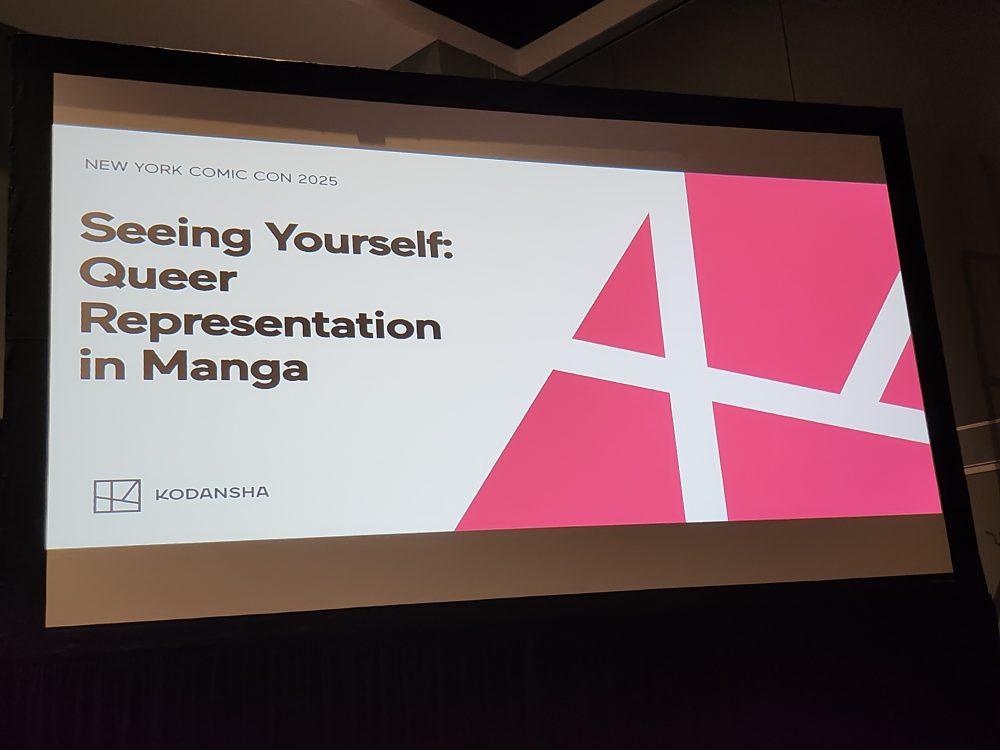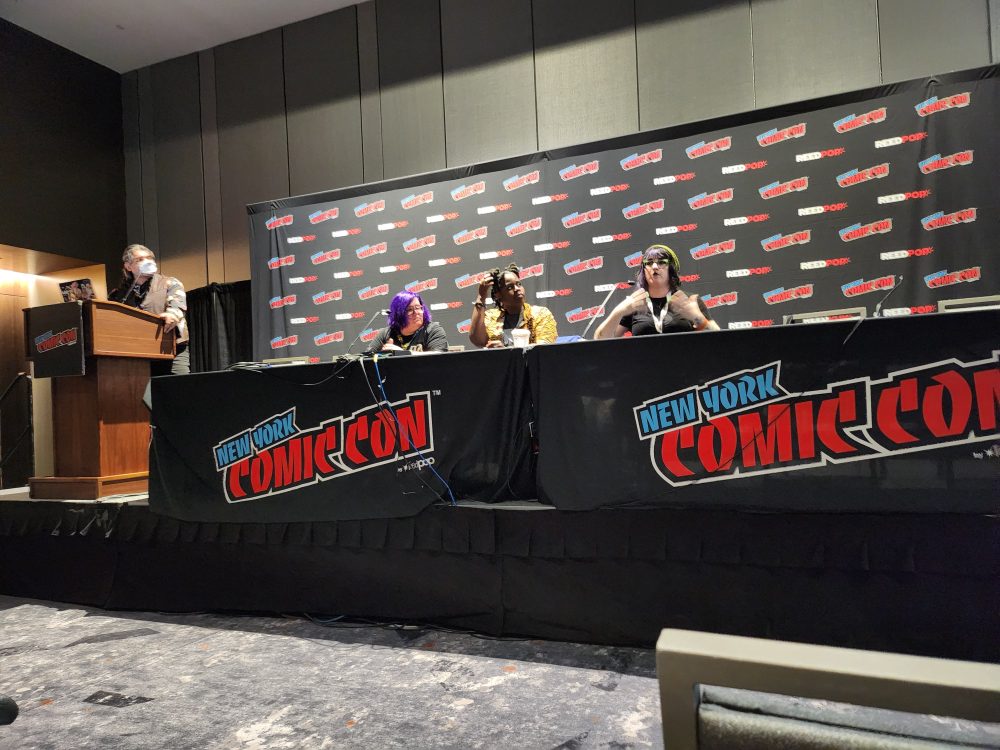On Saturday, October 11, the “Seeing Yourself: Queer Representation in Manga” panel, presented by Kodansha, started at 4:15 and was moderated by Ivan Salazar from Kodansha sales and marketing. The panel featured TJ Ferentini (senior editor at Kodansha), Gigi Murakami (creator of the VIZ Original one-shot Resenter), and Morgan Perry (marketing manager at Square Enix).


Perry was running late due to traffic on her way back from Kodansha House in SoHo, so the panel started without her. The panel began with a word from the sponsor Kodansha, highlighting several of their new releases and the pop-up event space and manga library Kodansha House. Salazar then transitioned to introducing a definition of media literacy and why it’s important, summarizing it as the ability to critically analyze text beyond the surface level presentation and understand deeper themes.
The first question for the panelists was “how and where have you seen yourself in manga?” which Murakami answered with Until I Love Myself by Poppy Pesuyama, a two-volume autobiographical manga about the mangaka’s journey to understanding their identity as nonbinary and dealing with sexual harassment in the workplace. Murakami said she had a lot of similar experiences to Pesuyama in college and high school, and is in the process of figuring out their gender identity.
Ferentini answered the question with Boys Run The Riot by Keito Gaku, a manga that was so popular in the US that the sequel was selected for Young Magazine’s US edition. (Don’t forget to vote for it to be serialized if you want more!) Ferentini said, “If this came out when I was younger, I would’ve figured myself out a lot sooner.” Salazar mentioned that the gender journey often comes with a lot of questions and doubts.
Salazar’s choice was My Lesbian Experience With Loneliness by Nagata Kabi, and said that Kabi’s self-medication with alcohol and food to heal her pain was very relatable. Perry was still running late, but her choice of Is Love The Answer? by Uta Isaki appeared in the presentation without her commentary.
In response to which characters they see themselves in now, Murakami answered with Nana Ozaki from Nana by Ai Yazawa, mentioning that she related to her deep and intense friendship with Nana Komatsu. “And she’s kissed quite a few girls, I’ve also kissed quite a few girls,” Murakami said, to laughter from the audience.
Ferentini said Reo Mikage from Blue Lock by Muneyuki Kaneshiro and Yusuke Nomura. “Purple hair, very dramatic, and his relationship with his friends is something I really relate to.” Reo’s intense possessiveness and jealousy over his friendships resonated with Ferentini. Salazar mentioned Ryuji Ayukawa, also known as Yuka-chan, from Blue Period by Tsubasa Yamaguchi. Yuka is rejected by their family for who they are, which is something Salazar fears. Perry’s answer was Frieren, from Frieren: Beyond Journey’s End story by Kanehito Yamada and Tsukasa Abe.
The panelists further discussed works they felt represented gender and sexuality well or had characters they found relatable. Murakami mentioned Hajime no Ippo by George Morikawa and Berserk by Kentaro Miura as examples of different types of masculinity and desire, and Witch Hat Atelier by Kamome Shirahama. Ferentini mentioned Senpai is an Otokonoko by Pom, I Cross-Dressed for the IRL Meetup by Kurano, and Last Gender by Rei Taki, which was the first manga they read featuring a pansexual character. Salazar recommended Welcome Back, Alice by Shuzo Oshimi, Dorohedoro by Q Hayashida, and The Summer Hikaru Died by Mokumokuren.
With five minutes left in the panel, Perry came running in, out of breath, just in time to share her recommendations: Otonari Complex by Saku Nomomura, On and Off: Work-life Imbalance by Shinnosuke Kanazawa, and My Dress-Up Darling by Shinichi Fukuda. She mentioned a shared theme of gender nonconformity through fashion in her selections.


Salazar’s final takeaway from the panel is that “knowing yourself is a revolutionary act.” Manga can be a way to find the words and frameworks that help marginalized people make sense of their identities.
“Is this my final form? Is there ever a final form?” Ferentini said.
Stay tuned to The Beat for more coverage from NYCC ’25.



